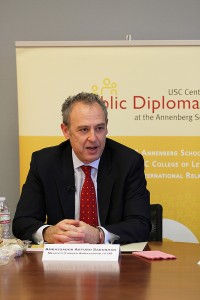Former ambassador analyzes US-Mexico relations
On Wednesday, the USC Center on Public Diplomacy at the Annenberg School for Communication and Journalism hosted Arturo Sarukhan, Mexico’s former ambassador to the United States and current fellow at USC’s Center on Public Diplomacy, in a panel on United States-Mexico relations.

Foreign ties· Ambassador Arturo Sarukhan speaks about the relationship between Mexico and the United States on Wednesday. – Corey Marquetti | Daily Trojan
Pamela Starr, associate professor of international relations and director of U.S.-Mexico Network at USC, and Jay Wang, director of the USC Center on Public Diplomacy, joined Sarukhan on the panel.
“No bilateral relation has as many implications for domestic politics as the relation between the U.S. and Mexico,” Wang said. “It is, in fact, an illuminating case of how intertwined and how interdependent foreign policy and domestic policy have become.”
Sarukhan, who served as an ambassador from 2007 until January of 2013, compared multiple perspectives on the Mexican-American relationship. He also brought humor into the discussion.
“Whenever one speaks, especially in this type of setting, I am reminded especially of what a friend in Texas told me. ‘Public speaking is like a Texas longhorn: there’s a point here, a point here and a lot of bull in the middle,’” Sarukhan said.
Jokes aside, Sarukhan also spoke seriously on the bilateral relationship between the two countries.
“As I thought of the conversation today, I thought it would make sense to do a sort of comparative approach, and use Charles Dickens as a template for the talks,” Sarukhan said. “And just as his template in the Tale of Two Cities the relationship between Mexico and the U.S. … is the best of times and the worst of times.”
Sarukhan said the “best of times” began with the North American Free Trade Agreement, which linked Canada, America and Mexico economically. This agreement revitalized Mexico and ended its jingoism while promoting increased codependence, he said.
“I think that NAFTA really changed how both governments interacted with one another,” Sarukhan said. “I know a lot of people who still believe that NAFTA is not a success, or a disaster, but we must agree that NAFTA is one thing and one thing only, a free trade agreement … and that it has done admirably well.”
Sarukhan gave examples of NAFTA’s effects, citing the fact that $1.4 billion worth of trade happens daily on the U.S.-Mexico border and that Mexico remains the second largest importer of American goods. He also argued that the recent reverse in immigration trends comes from NAFTA’s revitalization of Mexico. Sarukhan said that the hardest part in the relationship between the two countries comes in swaying the public’s opinions.
“Why is this the worst of times?” Sarukhan asked. “Because public opinions and public perceptions differ wildly from this diagnostic I have given you. And it’s basically been driven by … two drivers. The first one is obviously immigration … The second issue, obviously, has been the violence that has occurred through the shift in the paradigm of transnational crime.”
Sarukhan told an anecdote from when he became the first Mexican ambassador with an official Twitter account. Though he started tweeting in English, within three weeks, there was uproar in Mexico.
“‘Why are you tweeting in English? You have to tweet in Spanish,’” Sarukhan said people told him. “Then suddenly I realized that if I was to make headway convincing both sides of the border, I would have to tweet bilingually.”
Students who attended the event were impressed by Sarukhan’s speaking ability.
“[Sarukhan is] an amazing guy,” said Syuzanna Petrosyan, a second-year graduate student studying public diplomacy. “I’ve heard and read a lot about him. He’s a great speaker with a lot of experience. He’s very innovative in his approaches when it comes to diplomacy and foreign policy.”
Sarukhan, who will now serve as a distinguished scholar at the CPD, said his main difficulty as ambassador was catering to citizens of both Mexico and the United States.
“At the end of the day, and I’ll finish with this, if you were to ask me what was your most relevant challenge as a Mexican ambassador, I’d probably say winning both the hearts of Mexicans and Americans,” he said. “The largest challenge was to convince Mexicans and Americans that there are no two societies more relevant to each other’s well-being than Mexico and America.”
Follow us on Twitter @dailytrojan
